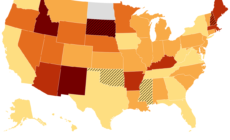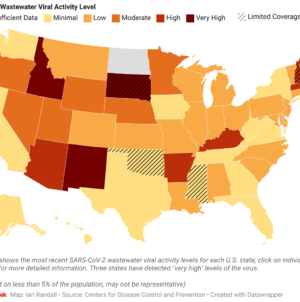-
COVID Map Update Reveals New States With ‘Very High’ Wastewater Activity - 13 mins ago
-
Why Israel and Hezbollah Are Still Firing Amid a Lebanon Cease-Fire - 13 mins ago
-
Millennial Explains to Gen Z the True Meaning of Low-Rise Jeans - 50 mins ago
-
Read President Yoon’s Speech Declaring Martial Law in South Korea - 59 mins ago
-
Hearts Melt As ‘Spicy’ Foster Kitten Discovers Joy of Hugs - about 1 hour ago
-
Jurors Set to Weigh Daniel Penny’s Fate in Choking Case That Divided New York - 2 hours ago
-
Will Joe Biden Pardon His Brother Next? What We Know - 2 hours ago
-
Israeli Officials Welcome Trump’s Demand to Free Hostages Before Inauguration - 2 hours ago
-
How the Hannah Kobayashi case led to Mexico and new revelations - 3 hours ago
-
FBI Files $3.4 Million Complaint Over Oligarch’s Music Studio Sale - 3 hours ago
Protein: How Much is Too Much? The Experts’ View
Some people can’t seem to get enough of protein. In shakes, in bars, in smoothies—or as big lumps of steak—it’s a macronutrient beloved my many, especially in the nutrition and fitness scene.
But experts disagree on the ideal amount of protein we should be eating, on whether we should be focusing on protein to maximize our nutrition, and on whether we might be in danger of eating too much protein instead.
Newsweek reached out to 10 different nutrition experts—all with different opinions—to ask them how much protein they, personally, ate every day.
Many of them quoted the recommended daily amount (RDA): in the U.S. national nutrition guidelines recommend eating at least 0.8 grams of protein per kilogram (g/kg) of body weight.
For someone that weighs 180lbs, or 82kg, that means eating 65g or 2.3oz of protein per day: just a bit more than one 10oz steak.
For nutritionist Mike Murphy—who said people should aim to eat about 1g/kg per day—eating enough protein is “one of the most important dietary goals someone can focus on.”
He said: “Protein balances blood sugar, promotes satiety, and it’s very difficult to overeat protein. Plus, we need protein to repair tissues and build things in the body, like enzymes, hormones, and muscle.
“I look at muscle as the most important longevity organ and we can’t hold onto it without getting enough protein in the diet.”

a_namenko/Getty Images
He said he got around 100g protein per day, which might look like: two eggs, a slice of sourdough toast and peanut butter for breakfast; a chicken breast, a cup of broccoli and a cup of quinoa at lunch; a handful of almonds for snacking; and a fillet of salmon and half a cup of lentils at dinner.
Murphy said that protein was “very difficult to overeat” and did not warn against overdoing it—but others more explicitly said there was no need to worry about eating too much.
“There really is no such thing as too much protein,” said Fredrick Hahn, a personal trainer who owns studios in New York and New Jersey. “Eating protein, which is so nutrient dense, increases satiety and you just can’t continue to eat it. Think about it: how many eggs can you really eat in one sitting?”
Melissa Boufounous, a sports nutritionist from Canada, spoke along similar lines, saying there was “a lot of fear and misconception” about high protein diets.
“Many studies have shown that it’s safe for healthy people to consume much more protein than the RDA,” she said, adding that the RDA was “just the minimum amount of protein needed to prevent malnutrition.” She mentioned that serious bodybuilders, who need more protein for muscle building and tissue repair, could eat as much as 4.4g/kg of protein safely: five times the RDA.
“I personally don’t see the need to eat more than 2g/kg of protein per day, but I wouldn’t be worried about my health if I did consume more than this amount on a regular basis,” said Boufounous.
Other experts were more restrained than this. Nutritional therapist Milena Mastroianni, for instance, echoed Murphy by saying, “it’s very hard to overeat protein especially from animal foods,” but added that some athletes might be safe eating up to 3.5g/kg.
And she cautioned that focusing too much on protein sources could push out other beneficial foods, such as fiber-rich vegetables, healthy fats and complex carbohydrates.
Dietitian, nutritionist and wellness coach Nichole Maholy also expressed balanced views, saying she personally wouldn’t eat more than 2.5g/kg of protein—”because it’s unnecessary”—but wouldn’t be concerned about eating significantly more than that.
“There aren’t randomized controlled trials to indicate that more protein is detrimental to our health, but there is some evidence to show that eating more than the recommended amount can come with side effects like digestive discomfort, dehydration or electrolyte imbalance, and put strain on the kidneys,” said Maholy.

piotr_malczyk/Getty Images
But most of the nutrition experts Newsweek spoke to said that they would be concerned about eating too much protein, for a variety of reasons.
Nutritional therapist Petronella Ravenshear said that excess protein got stored in the body as fat and that most people did not need more than 1g/kg of protein per day.
“The received wisdom is that high amounts of dietary protein help us to lose weight by boosting our metabolic rate, and our muscle protein synthesis, but the science doesn’t back this up,” she said.
Dietitian Nichola Ludlam-Raine said that, while there was “no definitive cap” on protein, there was only so much protein that the body could utilize.
“Excessive protein intake over a long period could place unnecessary strain on the kidneys, particularly with preexisting kidney conditions, though healthy individuals are less likely to experience issues,” she said.
Her limit was 2.2g/kg of protein per day. Beyond this, “the benefits tend to plateau,” she said, “and it’s important to focus on a well-rounded diet.”
Dietitian Dana Hunnes, a professor at the University of California, Los Angeles, seemed the most passionately against too much protein.
“We need far less protein than media influencers would have you believe,” she said. “We really don’t need any more protein than 1g/kg per day. More than that can put extra work on the kidneys.
“You want to eat just the right amount of protein, not too much and not too little. But, in the U.S., it’s very hard to eat too little protein, mostly because there’s such an emphasis on it.”
She said she stuck to plant-based protein, because it was gentler on the kidneys, and filled with fiber, antioxidants, vitamins and minerals, as well as being “environmentally conscious.”
But other nutrition experts, such as Ravenshear and Maholy, told Newsweek that they preferred getting their protein from animal foods, because they contained all the amino acids—protein building blocks—the body needs, and made it easier to meet their protein goals.
On the other side of the same coin was Thompson Maesaka: a neurological rehab clinic owner who used to train professional sports teams, and was an amateur bodybuilder, who ate 190g protein per day. Even he had his limits.
“Yes, there can absolutely be too much protein,” said Maesaka. “I think it’s hard to tell exactly how much is too much from person to person, and the easiest way to tell is by using intestinal discomfort and overall energy as a guide.
“If I don’t balance the sources of protein, I’ll get really lethargic and have a lot of stomach issues, which is my red flag to have a more balanced macronutrient ratio.”
Do you have a tip on a food story that Newsweek should be covering? Is there a nutrition concern that’s worrying you? Let us know via science@newsweek.com. We can ask experts for advice, and your story could be featured in Newsweek.
Source link





















